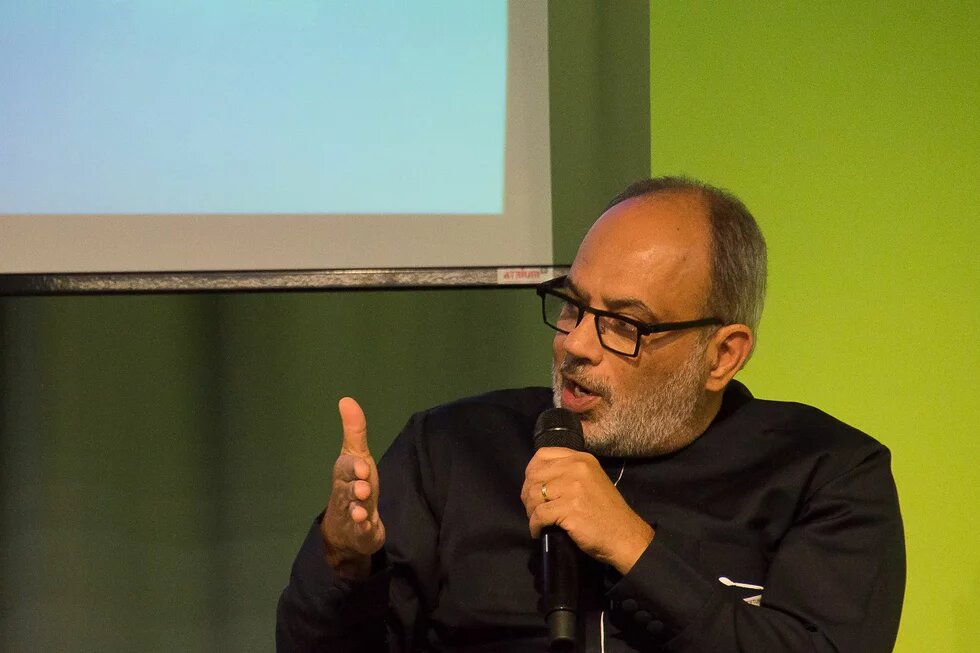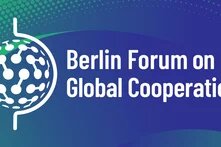
This keynote speech was part of the Berlin Forum on Global Cooperation 2025 and can be listened to here.
I'm going to cover five points – each one of them relating to the three questions that were posed to us. I hope it will be insightful, as it comes from a perspective of someone that has been involved in a number of these debates and dialogues but has been often cataloged as a bit of a radical. So, if you can tolerate a radical, you are going to have a slightly different view from what is common in these types of discussions.
Bridging the demographic divide
I'll start with my first point which already sort of sets the tone, because it's about demographics. I will mention that on demographics, we are leaving a demographic divergence. We have a global balance sheet that has gone gray. The demographic anxiety is in the wrong hemisphere, since we are talking about South Europe and East Asia graying at breakneck speed. Japan sells more adult diapers than baby ones. And China's workforce is shrinking faster than its Gross Domestic Product (GDP).
Meanwhile, Africa is home to the world's only expanding labor force but still is treated as a problem to manage, rather than a partner to empower. It is like watching a global relay race where one team is running out of runners and ignoring the only team that still has full strength. The global demographic shift is no longer about rapid growth but about unequal aging.
[...] What we need is [a demographic compact] based not on charity, not on containment, but on mutual need and shared economic interest.
While regions like East Asia and Europe, as I mentioned, face workforce in decline, we are not matching the possibilities of the future with investment or planning. The North, the Global North, if you will, resists migration precisely when it needs labor most, framing for instance Africa – not just Africa but rather Africa's youth – as a problem. This political blindness undermines global productivity and exposes multilateral incoherence. Multilateral institutions are stuck in the 20th century mindset, focusing on outdated fears of overpopulation, instead of enabling mobility and co-development. There is no global mechanism to align labor supply and demand. We talk a lot about labor – or rather, we talk about supply and supply chains – but we never align that discussion with labor supply and demand. A demographic compact is obviously necessarily needed and we had these various attempts by the United Nations (UN) to produce one. But what we need is one based not on charity, not on containment, but on mutual need and shared economic interest. Ignoring this will turn demographic asymmetry into a systemic crisis and we are seeing it already – and it's going to accelerate.
Global power is fragmented
My second point is about the fragmentation of global power and how this is creating an institutional drift. I would argue that part of it results from the way we are dealing with demographics. Power is no longer centralized. States, blocks, and issue specific coalitions coexist. They compete. The US is inward-looking right now. Europe is divided, and the Global South engages in multiple players, with multiple assets for sure, but completely disorganized and fragmented and without any ideological alignment. Multilateralism was built on stable hierarchies, predictable partnerships. But today's world is shaped in fluid interests, regional edging, all the time, and tactical alliances. So institutions cannot cope. The institutions struggle to adapt to this reality, but in fact, they are having the hardest time. Global South countries now navigate a flexible diplomatic space, dealing with China, the West, the Gulf actors and whatever comes under the sun. This shift, that they tactically use all the time, also reduces the relevance of rigid multilateral mechanisms and weakens any attempts of coordination. Institutional legitimacy is no longer determined by formal representation, as we were used to, but by a combination of formal representation and an array of other types of interventions. What matters is delivery. Delivery on debt. Delivery on climate. Delivery on digital access. If this doesn't happen, it's talk. And of course, we have a lot of talk, precisely to compensate the lack of delivery. Institutions that can't respond quickly, can be sidelined, and this is already happening. So in fact, power used to be like a G7 dinner. Assigned seating, fixed menu, and no surprises. Now, it's more like a global potluck, where everybody is bringing their own dish and nobody is using the same recipe.
We now attend summits for solidarity, sign deals in the corridors, but we don't believe in them. So I call this the end of consensus – the consensus as we know it.
The US is prioritizing economic resilience. They say this is the way they are going to build their economy. I have my doubts. Europe is multitasking, with one hand tied behind its back. It's the alliance of the past. China and India are playing different games altogether. And countries that are the most vulnerable, are watching this like a tennis play. The Global South is a nice word, as María Fernanda said. What does it mean? It's not aligning anything in particular. And this Global South is not even revolting against what I just described. It is just edging like pros, like tennis pros. We now attend summits for solidarity, sign deals in the corridors, but we don't believe in them. So I call this the end of consensus – the consensus as we know it. Because it was a consensus of words, where you discuss throughout the night the paragraphs, the bracket paragraphs, to get a declaration that is going to save the day. And you proclaim at the end of each one of these summits: it was successful, because we signed this declaration. It is completely meaningless because it was negotiated with the faith of the least common denominator – not because you want to implement it. Sometimes, the lowest common denominator is chosen not to enable implementation, but to undermine credibility – making the outcome so weak that it's ultimately unimplementable. And that has been the hallmark of the various negotiations that we have seen over the last decade and a half. So I will contend that we are not really seeing anything different, since the US administration became so dramatic with the assumption of power by President Trump. All that he is is doing is only a repetition of things that were already happening. Erosion of multilateralism? He didn't invent that; it was already happening. Financing of climate not happening? He didn't invent that; it was not happening. Erosion of engagements on climate? They were not happening. There was a lot of talk, but they were not happening. Introduction of trade protectionism? Come on, he didn't really inaugurate that. Lack of trust in negotiations relating to disarmment and peace and security? It was already the case. So we can go on with a very long list including disruption of value chains and we'll see that this US administration did not introduce anything new.
But two things have changed. The first is the sense of drama it introduces – acting without nuance, and on a massive scale, like a hammer blow delivered in one decisive move. Not slowly trending, it just goes one time. The second is the speed, which is linked to the first. So, it introduces drama and speed, but not novelty. Now, if it introduces drama and speed, it is because the trends were there and these trends are basically indicating to us that this is not a epiphenomena. This is epical. This is not going to reverse.
Trade dismantles the pillars of global cooperation
Which brings me to the key ingredient of this change, which is trade – my third point. Well, it's no longer a sport for gentlefolk. We have built our wealth over the last four decades, to be precise since the establishment of the World Trade Organisation (WTO), three decades. And it has been an amazing journey, but it is touching its head. Once upon a time trade was about win-win. It was about lowering barriers. That was the discussion. Now it's about tariffs for climate. I start with that one, because that was not invented by Trump. Tariffs for climate, subsidies for security – also not invented by Trump. And regulations as statical chess moves. Carbon Border Adjustment Mechanism (CBAM) is very good for the environment in Europe. It aims to save the planet for sure, but coincidentally, it's also saving the European industry. It's the kind of green where the money matches the carbon. Africa is caught between its aspirations to have a continental free trade area—and I was very much involved in its establishment—and external policy shocks, such as CBAM. CBAM is an external shock for Africa. That was not the intention, but it is the consequence. Trade has become like walking a tight rope during a windstorm. And you know, this is very important for us to bear in mind, because good intentions do not necessarily produce the best results.
And this is very much an example of that, and I'm happy to discuss it much more in detail. Trade is no longer governed by open market rules. Strategic competition now shapes industrial policy, with tariffs and subsidies deployed to build resilience. We hear that word a lot. But it's also about protecting supply chains in wealthy economies. So the WTO's dispute system is broken, which is the central tenet of its existence. Any reforms are stalled. For us in Africa, the Doha Round is now 17 years old. It was not being implemented because it was about development. We continue to have this asymmetric power determining rules on trade. Trade multilateralism is fading by default.
[...] I think trade is a very good example of what is happening to the world, because it's dismantling the fundamentals of cooperation and partnership.
What was meant to provide a buffer against global fragmentation has become slowly reduced, because of the impact it is having by not gearing its entire systemic ruling to protect the most vulnerable. Now, I think trade is a very good example of what is happening to the world, because it's dismantling the fundamentals of cooperation and partnership. And if we don't take cognizance of that, we are not going to be able to tackle a lot of challenges, including climate.
Obviously, if you say that you are going to impose tariffs on green electric vehicles from China, because you want to protect your industry, it's understandable. You want to protect the jobs but that's not a win for the climate. It's for something else. And we can go on with a lot of examples. I'm picking that one because of Germany and its reliance on automotive industry. So is Official Development Assistant (ODA) the answer for all of what I described?
Aid is no longer central for development
Well, I would argue that we are witnessing the end of aid centrality in development. Not the end of aid, but the end of aid centrality in development. It doesn't mean aid does not have a role – it can have a role – but its centrality is gone. And if it is gone, we have to adjust to what this implies. ODA still gets applauded in conference rooms, but the applause is more nostalgic than practical. Like someone clapping for a fax machine that still works.
The real capital flows now come through remittances. Then we go to demographics. Nobody wants to discuss that. It is twice as much as ODA. It has come from sovereign bonds; it comes from Gulf investment. Well, Mr. Trump is competing with us or China's terms, not Paris declarations or dry spreadsheets. Instead of asking: „Who gives 0.7 percent?" we should ask: „Who enables fiscal space? Who shares risk fairly? Who's crowding out the ones that are in blended finance deals?“ And this is the kind of challenges that nobody wants to discuss, because they are systemic. Aid volumes are shrinking, as María Fernanda mentioned, development needs are exploding – yes. But emerging lenders and market-based instruments have overtaken traditional donors. Sovereign bonds, remittances and even South-South financial flows are the ones that are shaping the financial landscape more than concessional aid. And you know, blended finance and mobilization narratives are basically about something that I hate, which is the word leveraging. So everybody has a bit of money and says „I'm going to leverage“. The problem is that everybody's leveraging everybody. You end up with the same money – the small one.
So how do we change that? The risk has to be transferred in a different way. The future of development finance must rest on fair pricing, not pricing that is determined by a notion of risk that does not correspond to reality. I'm just going to give you two figures about Africa. We export more capital than we receive. Come on – we are the poorest region of the world and we export more than we receive. Something is wrong, right? This has been happening for six decades. Another one, we have the least default rating of infrastructure projects in the world – less than in Europe. But we pay the highest premium risk. So something is wrong. These are the real changes. If ODA intervenes to change that, it's very much welcome. That's a different type of use of ODA. It doesn’t need as much money, but it needs systemic change.
Artificial intelligence challenges existing knowledge systems
Which brings me for my fifth point. What kind of disruption are we going to have on the technological front, particularly provoked by artificial intelligence (AI)? Is it going to be an element that is going to address some of these issues, for instance in terms of the labor market – a very disruptive moment that we are living?
AI is redrawing global power through knowledge control.
Well, I would argue that AI doesn't just disrupt – it also absorbs. What I mean is that it feeds on data, much of it scrapped from global commerce and spits out knowledge governed by a few firms and even fewer countries. So we are in the trajectory of higher concentration, not less. AI is redrawing global power through knowledge control. You think that soft power is to give ODA, to be nice in diplomatic circles – that is the past. The new soft power is to control the minds and you control the minds through social media and artificial intelligence. That is a much more powerful soft power. You don't need the other. You can scrap it. You control the minds.
In my part of the world, you would be amazed with the number of people that love Mr. Trump. I can't understand it. But I know why. It's because of these new forms of soft power. Model strain on global data now produce value concentrated in a few countries, in a few firms, leaving most of the world excluded from new knowledge economy. Intellectual property (IP) regimes that we are so used to, being the central tenant of our economic system – are exploding. Or imploding, rather.
Why? Well because we don't understand that artificial intelligence is about stealing. It's about stealing and recreating. And when you steal, it's very difficult to attribute ownership to specific types of knowledge. AI disrupts this model. And if you protected the standards of living based on intellectual property, in the future, this is no longer going to be possible. And the consequences are quite daring.
A global governance framework for AI is urgently needed, and this is not even in the UN discussions. AI must become a public good with inclusive rules, ethical standards, equitable benefits sharing. But this is not at all on the cards. It looks like it's something very remote.
Most of the Global South is invisible in this system.
Our languages on AI – marginal.
Our realities – misrepresented.
Our ownership – nil.
Even our creativity is monetized. It's monetized in Silicon Valley, but it's also monetized in Shenzen. Before we know, it went missing. IP systems weren't designed for this. IP systems are still based on the idea that we can patent solar panels – while AI models are remixing our archives without even saying thank you.
Where to go from here
Which brings me to my last point. So what kind of multilateralism are we going to have with all of this?
Multilateralism needs more than institutional botox. It needs very profound reform. Our institutions were designed for a slower, simpler world: fewer crises, fewer actors and more gentlemen's agreements. Today's world is faster, messier, and less polite. Legitimacy now comes from function, not from form. You deliver, you matter. It's transactional. You host more summits than solutions – you are background noise. Multilateralism won't die dramatically, as much as Mr. Trump will contribute to that drama. It will just stop getting invited. That's the real danger: Irrelevance. Irrelevance by obsolescence not by overthrow.
Now the world is changing faster than our institutional arrangements, our institutional reflexes. Now is the time not to adapt to something that is legacy, but to build the new.
Conclusion: Disruption is not a phase. It's a job description for all of us. Now the world is changing faster than our institutional arrangements, our institutional reflexes. Now is the time not to adapt to something that is legacy, but to build the new. This is not a pendulum swing, it's epical, as I mentioned, it's a landscape shift.
Our job is no longer to protect the system. We think it is – but it's to make it useful again. It is a slightly different proposition. Not the sanctuary of legacy agreements, that we are so attached to – even emotionally – but the scaffold for collective action in a fragmented world.
And for that we need to learn how to navigate turbulence. Turbulence – unpredictability – has been weaponized. If you live in a world where turbulence and unpredictability is weaponized, you‘d better be ready not to stick just to what you know, but rather prepare for what is new.


